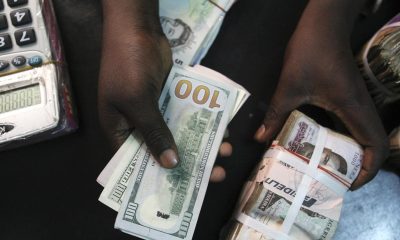Dollar to Naira Exchange Rates
Black Market Dollar To Naira Exchange Rate To 4th February 2023

What is the Dollar to Naira Exchange rate at the black market also known as the parallel market (Aboki fx)? See the black market Dollar to Naira exchange rate for 3rd February, below. You can swap your dollar for Naira at these rates.
How much is a dollar to naira today in the black market?
Dollar to naira exchange rate today black market (Aboki dollar rate):
The exchange rate for a dollar to naira at Lagos Parallel Market (Black Market) players buy a dollar for N748 and sell at N755 on Friday 3rd February 2023, according to sources at Bureau De Change (BDC).
Please note that the Central Bank of Nigeria (CBN) does not recognize the parallel market (black market), as it has directed individuals who want to engage in Forex to approach their respective banks.
Dollar to Naira Black Market Rate Today
| Dollar to Naira (USD to NGN) | Black Market Exchange Rate Today |
| Buying Rate | N748 |
| Selling Rate | N755 |
Please note that the rates you buy or sell forex may be different from what is captured in this article because prices vary.
IMF Predicts Fall In Nigeria’s Economic Growth, FG Targets Otherwise
The International Monetary Fund (IMF) has predicted a fall in the country’s economic growth to 2.9 % in 2024 from 3.2% in 2023.
The global money lender in its World Economic Outlook Update (January 2023) report revealed that Nigeria would have a shrink in economic growth by 0.3%.
According to the report, the country is however expected to grow from 3.0% in 2022 to 3.2% in 2023 because of certain measures put in place to tackle the issue of insecurity in its oil sector.
Naija News gathered that the report’s projection about this year’s 3.2% growth is an upgrade from the lender’s previous 3.0 growth projection for the year in its October outlook report.
It further explained that growth across sub-Saharan Africa would moderate at 3.8% in 2023 amid the prolonged fallout from the COVID-19 pandemic.
The IMF’s report states that “In sub-Saharan Africa, growth is projected to remain moderate at 3.8% in 2023 amid prolonged fallout from the COVID-19 pandemic, although with a modest upward revision since October, before picking up to 4.1 % in 2024.
“The small upward revision for 2023 (0.1 percentage point) reflects Nigeria’s rising growth in 2023 due to measures to address insecurity issues in the oil sector. In South Africa, by contrast, after a COVID-19 reopening rebound in 2022, projected growth more than halves in 2023, to 1.2% reflecting weaker external demand, power shortages, and structural constraints.
“Economic growth proved surprisingly resilient in the third quarter of last year, with strong labour markets, robust household consumption and business investment, and better-than-expected adaptation to the energy crisis in Europe.
“Inflation, too, showed improvement, with overall measures now decreasing in most countries—even if core inflation, which excludes more volatile energy and food prices, has yet to peak in many countries.
“Elsewhere, China’s sudden re-opening paves the way for a rapid rebound in activity. And global financial conditions have improved as inflation pressures started to abate. This, and a weakening of the US dollar from its November high, provided some modest relief to emerging and developing countries.”


